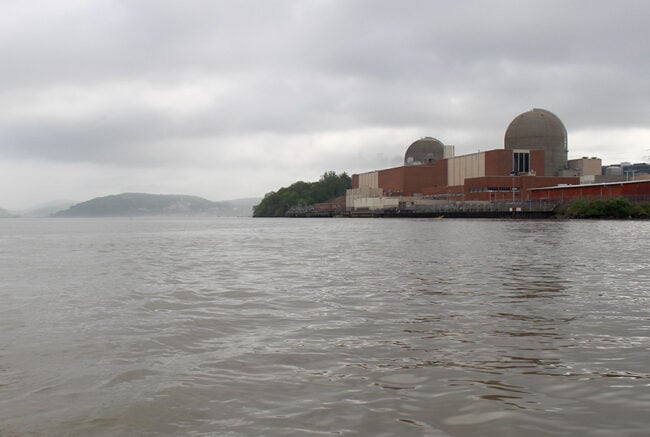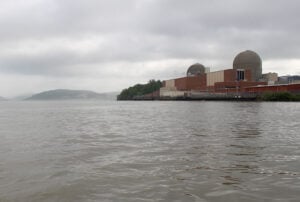The Public objects to Holtec’s release of radioactive wastewater from Indian Point into the Hudson River

View more images on our Flickr site
Riverkeeper joins call for storing tritium-contaminated water in tanks on site while seeking a safe disposal method
UPDATED to reflect Holtec’s decision to “pause” its plans to discharge wastewater in early May.
Holtec International, the firm responsible for decommissioning the Indian Point nuclear power plant, has stated that it will resume discharging radioactive wastewater into the Hudson River from a spent fuel pool on the site.
 After hearing presentations from Holtec and David Lochbaum, a retired nuclear engineer, reactor safety watchdog, and member of the Decommissioning Oversight Board (DOB), along with fellow environmental advocates, Riverkeeper is calling for a halt to the discharges and a means of storing the contaminated water safely in tanks on the site while safer disposal methods are evaluated. It’s time to draw the line against using the Hudson as a dumping ground for tritium, a radioactive isotope found in the wastewater. Ingestion of tritium is linked to cancer, and children and pregnant women are most vulnerable.
After hearing presentations from Holtec and David Lochbaum, a retired nuclear engineer, reactor safety watchdog, and member of the Decommissioning Oversight Board (DOB), along with fellow environmental advocates, Riverkeeper is calling for a halt to the discharges and a means of storing the contaminated water safely in tanks on the site while safer disposal methods are evaluated. It’s time to draw the line against using the Hudson as a dumping ground for tritium, a radioactive isotope found in the wastewater. Ingestion of tritium is linked to cancer, and children and pregnant women are most vulnerable.
A groundswell of public voices is objecting to Holtec’s discharges that prioritize profit margins and expediency over the Hudson River, and local communities. Riverkeeper supports their request to explore alternatives to dispose of the tritium.
View our recorded webinar, held March 16, 2023, to learn more:
View the slides from the above presentation [PDF].
The DOB held a nearly four-hour meeting on Thursday, February 2, to discuss disposal options that would spare the River and hear community concerns from numerous residents, officials and experts.
Four readily available wastewater disposal options became clear during the meeting:
- Hold the wastewater on site. Although no definite holding time was discussed at the meeting, storage on site was. We believe an initial 12 year period would be appropriate. After 12 years, tritium’s half-life (the radioactive isotope) will have cut its activity by 50%. During this 12-year period we would like Holtec to explore separation of the tritium, solidification, and any other options that emerge.
- Transfer the wastewater to out-of-state sites. The danger of transporting radioactive waste on our roads and railways increases the risk to millions of people as accidents have and will occur in an uncontrolled environment. Even if safe transport is successful, transferring the problems of radioactive waste to other communities is not fair or equitable.
- Allow for evaporation of the wastewater. Evaporation methods for the wastewater are a poor option as after the evaporation is absorbed into the air the contaminants will fall back to the ground, covering a much wider footprint that could include schools, parks and residential areas. A consensus emerged during the DOB meeting rejecting this option.
- Discharge the wastewater in the Hudson River. This is the method the plant used while it was still operating. We believe it is time to take a precautionary approach and end the practice of dumping radioactive wastewater into the Hudson.
As with any nuclear plant, none of these options are risk free. Without research that shows the true impact of tritium on vulnerable populations, we should not take any chances to impose unnecessary risk.
The previously documented mistakes, violations and fines incurred by Holtec raise serious concerns and demand that we take the most cautious approach of the available actions that will keep this contaminated wastewater out of the Hudson River. That means storing it on site for at least a 12 year period, allowing contamination levels in the water to decrease, and for better, less dangerous disposal options to be developed during that time.
Riverkeeper is reaching out to decision-makers on the local, state and national level to explore every possible action and option that will halt any further harmful discharges by Holtec into the Hudson River.
Update: On April 6, in a letter to the U.S. Nuclear Regulatory Commission, U.S. Senators Chuck Schumer and Kirsten Gillibrand “write to express our significant concerns regarding Holtec Decommissioning International’s (Holtec) decision to expedite its planned release of over one million gallons of radioactive wastewater from the Indian Point Energy Center (IPEC) into the Hudson River.” Read the letter.
Update: On April 13, Indian Point Decommissioning Oversight Board Chairman Tom Congdon announced Holtec’s “voluntary pause” on its plan to expedited the releases and conduct them in early May. “The decision to pause the May 2023 releases from the Indian Point spent fuel pools will allow the State to independently analyze the spent fuel pool water before it is released. Holtec’s pause will also allow time for the Nuclear Regulatory Commission, which has jurisdiction over these discharges, to answer the important questions Senators Schumer and Gillibrand recently raised and to directly address concerned members of the public and local elected officials at an upcoming meeting of the Decommissioning Oversight Board.”
Urge Governor Hochul & State Legislators to stop radioactive dumping into the Hudson River

Support legislation that would prohibit the discharge of radioactive water into the Hudson. Together, we can protect and restore the Hudson River for the health and safety of all who depend on it.
To stay informed, please sign-up for email updates HERE.
